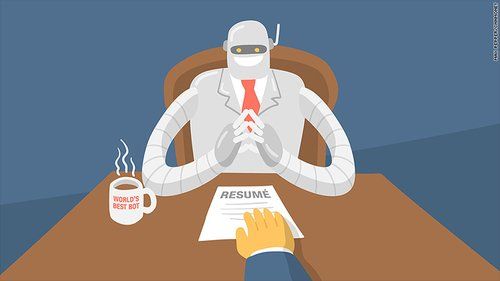Will your next Interview be with a Robot?
We attended a great VIVID event recently, held by We Are Social’s Suzie Shaw and Simon Kemp; Marketing to the Machines. They took us on a journey of understanding how pervasive algorithms have become. We all know that algorithms are the all powerful force that analyses all our interaction data and ultimately controls our Facebook feeds, but when we start peeling back how we are living our lives today, algorithms are everywhere! As Suzie said, algorithms are determining who we hear from, who we talk to, who we date, what we buy and even what we earn.
Ummmm, what’s an algorithm?
Let’s clear this up first; an algorithm is a process or set of rules to be followed in calculations or other problem-solving operations, especially by a computer. Simples.
Although we might not be aware of this, we are starting to rely on algorithms. Suzie and Simon talked about new products such as Google Home and Amazon Alexa, which sits in our homes, listens to what we say, what we watch and listen to, and allows us to use voice activated controls to shop. It’s using all it ‘hears’, and a range of algorithms to ‘help’ us shop in its store. Exciting or freaky?
Now Suzie and Simon tailored their talk to the role of algorithms in marketing. But it got me thinking about my job, and made me want to look at the role algorithms are starting to play in recruitment and job seeking.
What role do algorithms already play?
Using algorithms in the recruitment process is not new. There are various software and programs around which can help to review job applications. Essentially, the program will look for the presence of certain keywords to ascertain if a CV has enough relevant experience to match a particular role. Many big corporates or large recruitment companies will use this method to ‘screen’ large volumes of applications.
Of course, this screening method is only as good as the program used, or the algorithm which sits behind it.
If I’m honest, as someone who reviews every single job application for roles I manage, I quite like the idea of something that can make me more efficient at my role, and will filter out applications from people with zero relevant skills for the roles I’m managing, enabling me to focus on those with relevant profiles.
Holly Fawcett at Social Talent talks about robots taking out the ‘grunt work’ from recruitment, freeing up consultants to do more of the strategic work; consulting to clients and candidate care; really guiding and advising candidates through the job search process. I certainly like the sound of this!
Forget RoboCop, hello Robo-Recruiter?!

Lots of people are following the rise of Bots, and in recruitment, this is also starting to happen.
I thought I’d hit on a unique idea here with RoboRecruiter, but a quick Google search reveals that RoboRecruiter already exists….. There’s a start-up in San Francisco that has developed an ‘AI Recruiter’. It’s worth a play, but I found that pretty quickly it was pushing me to talk to a consultant, without actually gaining that much relevant information about the kind of roles I was looking for beyond the basics of title, location, and industry.
There’s also Mya, that can evaluate resumes, schedule and conduct applicant screenings, great when roles have a high volume of applicants.
Are computers/algorithms less biased?
One of the arguments for using algorithms to screen job applications is that a computer can’t be consciously or unconsciously biased. Therefore, without bias, the theory is there should be a reduction in discrimination based on gender, age, race, etc. That’s got to be good, right?!
So then it could be said that computers could actually help you get a job where humans might be biased against your profile. But let’s not forget, unless Robots are interviewing us, the biases will probably still happen in the interview process, even if a computer has helped you get to interview stage.
Will your next interview be with a robot?
Yes, this is already happening; and in Australia. La Trobe University’s robot, Matlda, has been programmed to conduct interviews, then it records and analyses the interviewee’s responses, monitors facial expressions and compares them to other successful employees within the hiring company.
An interesting point here is whether Gen Y and Gen Z will even think this is a bit deal, considering how much they are already embracing digital and AI into their everyday lives.

Can algorithms actually help to recruit BETTER candidates
Some studies have been conducted to review whether algorithms can select ‘better’ employees. One study showed that those recruited by an algorithm stayed longer in their roles and were more productive. However, this study was for the low-skilled labour sector, and I’m not sure of any research for the industry we focus on (Marketing & Advertising).
However the role of predictive analytics is certainly an interesting one, but it means that HR teams need to capture a lot more data on their current employees to enable this kind of analysis.
Am I out of a job
Whilst there are undoubtedly some really interesting developments in using technology and algorithms to assist in the recruitment process, I’ve got to say I’m a little old skool in that I truly believe in the human factor.
The guys at We Are Social talked about the differences between computers and humans being the ability to have empathy. Some think that eventually, AI will become so good that computers will indeed be able to display empathy, but I don’t think we’re there just yet.
Along with empathy comes the very simple factor of human interaction with someone who knows their stuff. At our recruitment consultancy, it’s all about direct access to specialist consultants. So for us, using CV screening algorithms, bots or any other AI takes us away from this positioning. But is this a good business proposition that will hold us in good stead long term, or are we missing the opportunity to innovate?
So am I out of a job anytime soon?
As long as the human factor is needed, and we have the capacity to judge someone’s POTENTIAL to succeed in a FUTURE role, I think I’ll still have a job to do next week, but maybe in a few months, a Robo-Recruiter will be helping me out.
Jo Gobbo is a Senior Talent Consultant at iknowho, a specialist recruitment consultancy in the creative agency and marketing space.
jo@iknowho.com.au / 02 8925 9209
SOURCES
https://www.ft.com/content/ad40b50c-6e9a-11e6-a0c9-1365ce54b926
http://recruitingtools.com/future-of-recruiting/
http://money.cnn.com/2017/05/16/technology/ai-recruiter-mya-systems/
https://www.theguardian.com/careers/2016/dec/14/soon-robots-could-be-taking-your-job-interview
http://recruitingtimes.org/news/16065/robots-take-job-interview/










